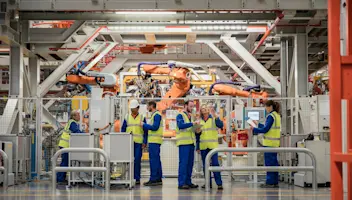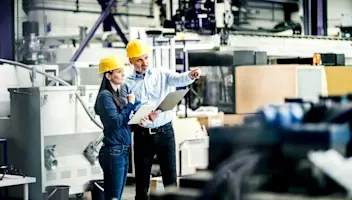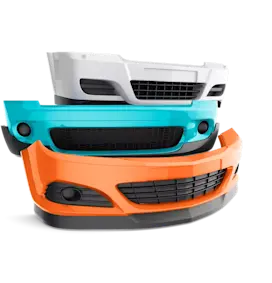Manufacturing Automation Technology Should Empower People, Not Replace Them
Manufacturing Automation Technology Should Empower People, Not Replace Them
Manufacturing Automation Technology Should Empower People, Not Replace Them
17 Jun 2021
Jim Tuttle
Industry 4.0 is the age of automation. It’s an exciting time to be in manufacturing; technology is enabling us to work quicker, more efficiently and accurately than ever before. But inevitably, change this disruptive is impacting the workforce.
On the surface, it feels like we’re watching machinery gradually replace people. Since the mid-1980s, US private sector manufacturing employment has declined from around 20 million to 13 million people. However, these numbers don’t tell the full story.
Rather than making the workforce less relevant, automation is reinforcing the need for human ingenuity. It’s taking away boring, monotonous tasks and giving people the chance to be more innovative, creative, and productive. If anything, technology is empowering the people central to manufacturing operations, increasing their value.
Technology Frees People to Focus on New Work
There’s no escaping the fact that Industry 4.0 is changing the manufacturing workforce. There isn’t a need for sheer numbers anymore, because technologies like enterprise resource planning (ERP) software are taking over previously manual processes.
But while manufacturers may need to streamline numbers as automation increases, those people who remain in their business have a pivotal role to play.
With technology taking care of repetitive tasks, manufacturers have an opportunity to focus on how people’s skills and knowledge can add value. Rather than taking responsibility away from them, ERP software is putting processes in places to support the workforce—e, enabling them to perform to their full potential. In fact, McKinsey research has shown that digital transformation can free up as much as 30% of employees’ time to focus on new work.
Technology is programmed to do certain things to a higher standard. It’s less prone to error and doesn’t fatigue in the same way. This makes manufacturing ERP software better placed to run business areas like quoting, inventory management, production scheduling and quality control.
However, tech creates an efficient, reliable platform for the manufacturing workforce to build on, creating new designs, improving product development, and nurturing customer relationships. These are inventive, strategic, personal tasks that machinery cannot replicate. And this type of work is way more satisfying and motivating than spending each day doing mundane, repetitive jobs.
People Make Sense of Digitally-Generated Data
It’s not just process automation where technology is changing the game, either. The data being generated by digital operations is allowing employees to perform better and make stronger decisions.
Real-time analytics and reporting have fast become the bedrock of manufacturing operations. And while people may have feared being measured at first, most workers now realize that data insights actually identify where manufacturing ERP software can be used to enhance their role—not replace it.
Digital transformation is also changing the type of jobs available in the manufacturing industry. There’s much greater demand for tech roles, and skilled analysts who can take the vast ocean of data being generated by operational systems and turn it into strategies that drive growth and profitability. Information is worth very little without meaningful human interpretation.
Traditionally, manufacturers may have relied on consultants or short-term contractors to manage technology implementations. However, full-time resources are now required to make sure machinery and software is continually driving ROI—and there’s a shortage of qualified professionals for these positions.
Recent research by Deloitte revealed that 36% of manufacturers are finding it harder to recruit the right talent than just three years ago, while 77% say they struggle to retain good workers.
Developing the right skillset is a long-term strategy. One of Aptean’s clients in the fabricated metals sector has formed a network with neighboring businesses that invites schoolchildren to tour their facilities and inspire them to pursue manufacturing technology careers, even hosting virtual events to teach them skills that are relevant to manufacturing in the digital era. One of their previous participants is now working as a robotic welder for the company, having been awarded an internship on graduation.
Organizations need to think carefully about how to reskill the staff they’ve got and create attractive working environments, powered by ERP software, to show potential new hires that they’re at the cutting edge. This will only happen if manufacturers take a strategic approach to digital transformation.
People and Machinery Drive Collaborative Growth
It’s easy to be reductionist about the future of manufacturing, viewing automation as a straight swap for manual processes. But industry leaders realize that technology is most powerful when it empowers people, not when it replaces them—and they’re investing in manufacturing ERP software that increases their teams skilled task load and decision-making capabilities.
Inevitably, the shape of the manufacturing workforce will continue to change over the next decade, and certain roles will become obsolete. But those that remain will be the beating heart of the business, using technology to become more proficient and creative, and finding opportunities to grow customer relationships and nurture new opportunities.
The challenge manufacturers face is making sure digital transformation is strategic; not just piecemeal software purchases that optimize certain elements of their operation. In the age of automation, change needs to be holistic, with manufacturers putting the training and support structures in place to enhance their people’s value through technology.
Aptean’s Industrial Manufacturing ERP Software provides real-time data insights and process automation to empower people and drive shop floor efficiency. Get in touch with our team of industrial manufacturing experts to find out more about our technology.
Related Content





Start transforming your business today
If you’re ready to take your discrete and industrial manufacturing business to the next level, we’d love to help.



